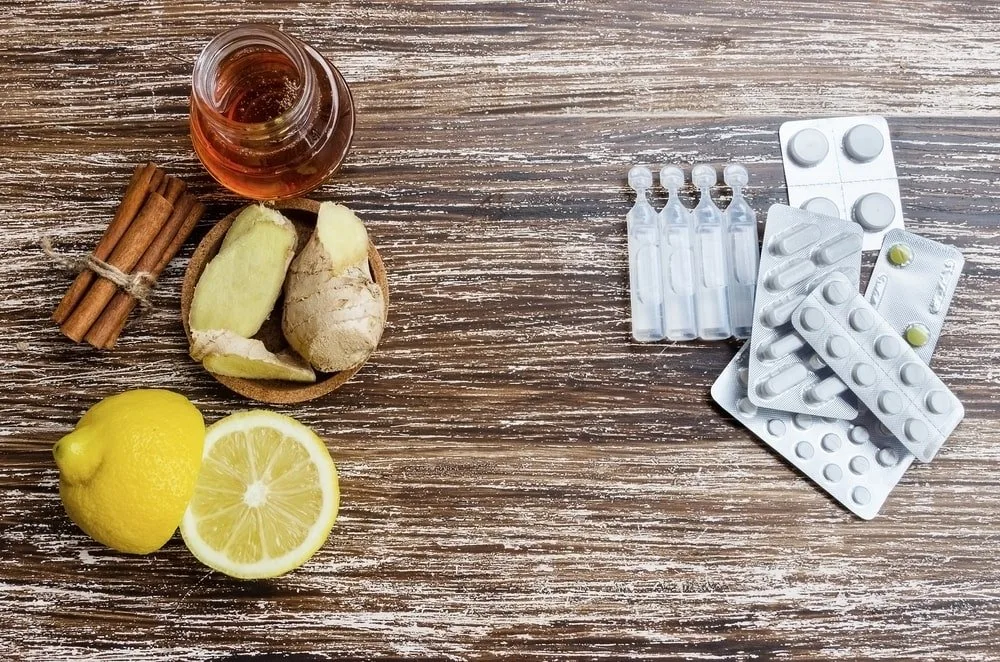Antibiotics are some of the most commonly prescribed medications in the world. In fact, antibiotics are regularly overprescribed, especially for conditions that cannot be treated with antibiotics. Not to mention the concerns about the overuse of antibiotics, there is now a growing need for more natural methods that can help to protect both one’s health and immune system, and this has made way for the growth of natural antibiotics.
The case for antibiotics
Yes, when used correctly, antibiotics are a great tool in fighting off bacterial diseases such as tuberculosis, strep throat, and urinary infections. They will not treat viral infections such as colds and flu.
The concerns regarding the use of antibiotics are usually focused on their side effects as well as the heightened risk of antibiotic resistance. The side effects linked to the use of antibiotics include allergies, as well as the disruption of healthy bacteria in the gut, which then affects our overall health (1).
Antibiotic resistance 
Unfortunately, a lot of the time, doctors may prescribe antibiotics when you don’t even need them. Why? Often, diagnosing a patient’s condition can take up both time and money, therefore doctors may prescribe antibiotics as a “just-in-case” elective.
It may sound crazy, but the bacteria in your body can outsmart the antibiotics prescribed by your doctor. In fact, the Centers for Disease Control and Prevention found that each year 2 million people in the United States become infected with drug-resistant bacteria and at least 23,000 people die from these infections.
So, if you really want to reduce your risk of antibiotic resistance, it’s important to only use antibiotics to treat confirmed bacterial infections. In fact, don’t shy away from calling your doctor out if they want to prescribe you antibiotics for a viral infection. Also, when prescribed antibiotics, make sure to take the entire dosage as directed.
5 Natural antibiotics
As a result of the rise of antibiotic-resistant bugs, as well as viral infections, a lot of people are looking to more natural methods that can help to effectively protect the body from, as well as reduce, the levels of harmful bacteria in the body. Additionally, these natural antibiotics cause very few side effects, and they also boast additional health benefits.
1. Garlic
Garlic is incredibly rich in antibacterial properties, particularly the compound allicin. In fact, research published in the Avicenna Journal of Phytomedicine suggested that garlic can be effective against many forms of bacteria, including salmonella and e. Coli.
Additionally, separate findings published in the Annali dell’ Istituto Superiore di Sanità journal also suggested that garlic can be considered for use against multi-drug resistant tuberculosis.
In addition to killing off bacteria, garlic has also been found to protect your immune system by reducing the risk of becoming sick in the first place, as well as how long you stay sick.
In order to maximize its full antibiotic properties, you’ll need to eat garlic raw. Now some may find it too pungent, but you can try adding it into a soup, or a glass of water before drinking it.
2. Manuka Honey
If there’s one kitchen staple that everyone should have in their home, it’s honey. In fact, findings published in the Asian Pacific Journal of Tropical Biomedicine found that honey can restrain around 60 different kinds of bacteria.
Manuka honey is probably the most superior form of honey out there as it contains more active antibacterial properties.
Harvested from special bees that drink nectar from the flowers that are found on the Manuka tree, native to New Zealand and Australia, Manuka honey is one of the most medically viable and potent forms of honey.
According to a study published in the Frontiers in Microbiology journal, Manuka honey can not only effectively inhibit multiple drug-resistant pathogens, but it can also be used to prevent the growth of bacteria in wounds.
When it comes to purchasing Manuka honey, be sure that you look at the UMF (unique Manuka factor) as this will help you choose honey of high quality. Opt for a UMF between 12 and 16.
3. Ginger
Ginger possesses both antibacterial and anti-fungal properties, making it one of the best natural antibiotics out there.
For instance, a study published in the International Journal of Molecular Sciences highlighted ginger’s effectiveness in fighting many strains of bacteria.
4. Clove
A versatile spice that’s used to flavor dishes, cloves contain excellent antibacterial properties, which is probably why they are routinely used to promote oral health (2).
What’s more, an aforementioned study published in the International Journal of Molecular Sciences suggested that cloves contain the ability to hinder the growth and survival of bacterial infections in the body.
5. Turmeric
One of the most beloved and widely used spices in the world, turmeric is extremely rich in antimicrobial properties.
Curcumin is the most active component in turmeric and is the reason for its many health benefits. According to research, curcumin can help to treat UTIs as well as stop the replication of the hepatitis C virus (3,4).
Conclusion
While natural antibiotics have few side effects and provide additional benefits, it’s important not to self-diagnose and treat yourself. Rather, speak to your doctor before you begin to increase your intake of natural antibiotics.
You can also fight infections (as well as protect your immune system) through lifestyle choices. Do so by getting enough sleep, reducing your stress levels, staying active, and eating a healthy and balanced diet.
References
Anggakusuma, Colpitts CC, Schang LM, et al. (2014). Turmeric curcumin inhibits entry of all hepatitis C virus genotypes into human liver cells. Gut, 63:1137-1149.
Bayan, L., Koulivand, P. H., & Gorji, A. (2014). Garlic: a review of potential therapeutic effects. Avicenna journal of phytomedicine, 4(1), 1–14.
Carter, D. A., Blair, S. E., Cokcetin, N. N., Bouzo, D., Brooks, P., Schothauer, R., & Harry, E. J. (2016). Therapeutic Manuka Honey: No Longer So Alternative. Frontiers in microbiology, 7, 569. https://doi.org/10.3389/fmicb.2016.00569
Dini, Catia & Fabbri, Alessia & Geraci, Andrea. (2011). The potential role of garlic (Allium sativum) against the multi-drug resistant tuberculosis pandemic: A review. Annali dell’Istituto superiore di sanità. 47. 465-73. 10.4415/ANN_11_04_18.
Kothiwale, S. V., Patwardhan, V., Gandhi, M., Sohoni, R., & Kumar, A. (2014). Journal of Indian Society of Periodontology. 18(3), 316–320. https://doi.org/10.4103/0972-124X.134568
Liu, Q., Meng, X., Li, Y., Zhao, C. N., Tang, G. Y., & Li, H. B. (2017). Antibacterial and Antifungal Activities of Spices. International journal of molecular sciences, 18(6), 1283. https://doi.org/10.3390/ijms18061283
Mandal, M. D., & Mandal, S. (2011). Honey: its medicinal property and antibacterial activity. Asian Pacific journal of tropical biomedicine, 1(2), 154–160. https://doi.org/10.1016/S2221-1691(11)60016-6
Pérez-Cobas AE, Gosalbes MJ, Friedrichs A, et al. (2013). Gut microbiota disturbance during antibiotic therapy: a multi-omic approach. Gut, 62:1591-1601.
Xue, W., Qi, J., Du, L., (2017), Intervention effect and mechanism of curcumin in chronic urinary tract infection in rats, Asian Pacific Journal of Tropical Medicine, Volume 10, Issue 6, Pages 594-598, ISSN 1995-7645, https://doi.org/10.1016/j.apjtm.2017.06.009.



One Comment